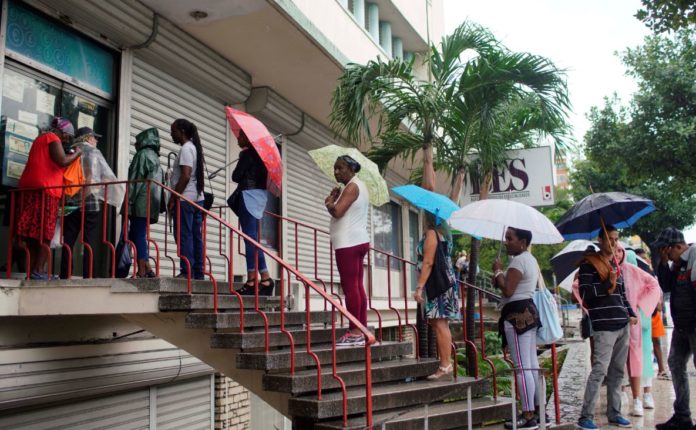The United States government will announce on Friday the scope of a series of new sanctions against the Cuban regime. Specifically, seven tourism and financial sub-entities will be prohibited from doing business with Canadian companies and citizens.
Among them, Fincimex stands out, a financial institution controlled by the Armed Forces that has almost absolute control over the sending of remittances – through formal routes, which represent just over half of the total – to the island.
The measure, the State Department said when communicating its imposition, “will help address the regime’s attempts to control the flow of foreign currency that belongs to the Cuban people.” ” The people should be free to decide what to do with their own money ”, added the document.
Before the imminent announcement, the president of Havana Consulting Group, Emilio Morales, detailed the framework through which the Armed Forces keep the vast majority of the money sent through that channel, and analyzed the scenarios that could take place depending on the scope that the Treasury secretariat of sanctions.
In a conference that took place in the city of Doral, in Miami, Morales indicated that 95 per cent of formal remittances go through Fincimex. And he explained that despite the fact that the senders make the shipments in foreign currencies, they never reach the island: they are deposited outside the island and the recipient is given “Cuban Convertible Pesos” (CUC), which are tied to the price of the American dollar. In addition, he recalled that the regime imposes a 10 per cent conversion tax.
“When you send USD 100, you think that money will arrive. However, people only receive CUC 87 for the tax,” said Morales. And he added: “In addition, that currency can only be used in retail chains in Cuba, where you can buy certain products that have a 240 per cent tax“.
Adding the conversion tax and artificial levies in stores that accept CUC, he explained, the Cuban Armed Forces are left with almost USD 75 for every USD 100 that is sent as a formal remittance to the island.
“That is what the State department points to. Not because there are no remittances, but to a multi-million dollar business. From 1993 to 2019, the Cuban authorities have obtained almost USD 19,000 million, something that its economy has been unable to produce,” said Morales. In the last year, the figure amounted to USD 3,716 million.
That system, indicated the head of the Havana Consulting Group, has led to the proliferation of sending money through informal channels, where people travel to Cuba and hand it in personally. “It is the only way that guarantees delivery in real convertible currency,” he said, referring to the fact that CUCs are not accepted outside the island.
To illustrate the role of the so-called “mules”, Morales indicated that since 1993 almost USD 28,000 million have been sent, a figure higher than his formal counterpart. “The total adding both is almost USD 47,000 million, almost equal to the external debt that Cuba had with all its creditors in 2015,” he said.
And he added: “Cubans who leave are allowed to leave so that they can maintain the country through remittances. The sanctions do not seek to eliminate them, but to get the military out of business.” The head of the Cuban Armed Forces is Leopoldo Cintra Frías, who was sanctioned in January of this year by the United States for his “flagrant violations of human rights and use of violence” in Venezuela. Consequently, neither he nor his immediate relatives can enter the United States.
In another passage of the conference, Morales considered the different scenarios that could take place depending on the scope of the sanctions, including the possibility that companies such as Western Union – the one with the highest volume of shipments of those that have a contract with Fincimex – stop fully operate in the framework of the pandemic.
An alternative, he said, could involve the transfer of the operation by the regime to another institution that has not been sanctioned by the United States. However, he assured that this will also impact the Armed Forces.
“If you go to banks that do not belong to the military structures, it will be more difficult for them. I don’t know how they are going to do to get the money out of there,” he said.
And while he conceded that other companies could absorb some portion of the market, he assured that the vast majority will resort to informal channels. “The (formal) costs are going to be higher and people are going to depend more on the mules“.
However, the flow of people between the island and citizens in the United States has been significantly reduced during the new coronavirus pandemic. And, considering that absolute normalization is not on the horizon, Morales addressed a possible scenario where formal remittances are completely and immediately interrupted.
“It would be like cutting the last thread of oxygen left on the island because there would be no flights (with the regular consistency) until August. Many people would be between a rock and a hard place. Those who control the money and the Cubans who receive it,” he said.
However, he said, “there will always be a way” to get the money. “The alternative of the mules will always exist. Beyond the current restrictions due to the pandemic, there are 20 daily flights to Cuba. “But, by way of conclusion, he ruled: “The only viable formula is to free the productive forces.”
